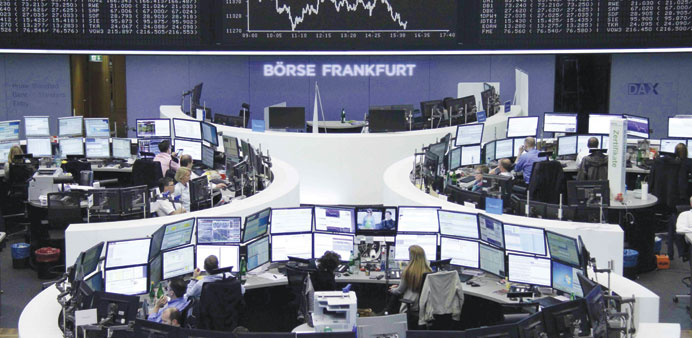Traders are seen at the Frankfurt Stock Exchange. The DAX 30 fell 0.94% to 11,328.80 points yesterday on slow progress in debt talks between Athens and its creditors.
AFP/London
European stocks tumbled yesterday as the Eurogroup chief reported slow progress in debt talks between Athens and its creditors aimed at preventing Greece from defaulting.
The CAC 40 in Paris shed 0.41% to close at 5,004.46 points, while in Frankfurt the DAX 30 fell 0.94% to 11,328.80 points.
Outside the eurozone, London’s benchmark FTSE 100 index finished the day down 0.36% to 6,928.27 points.
But the euro shot up to 1.1116 from 1.0924 late in New York on Monday.
“Ongoing Greek talks remain one obvious risk event this week especially as the country needs to pay €300mn to the IMF on Friday,” said Craig Erlam, senior market analyst at Oanda foreign exchange trading company.
“There are some small signs of progress being made although that is doing little to settle the markets, with most European equity indices in the red ...” he added.
Greece said yesterday it had made “difficult concessions” in a “realistic” reform plan it has put to its creditors as a critical repayment on its massive debt looms.
However the head of the eurozone finance ministers, Jeroen Dijsselbloem, later said that “not enough” progress had been made and no “half-way” compromise would be considered.
“There is some progress, but it’s really not enough,” Dijsselbloem said on Dutch television of the talks aimed at unlocking €7.2bn in remaining bailout funds.
“We’re still nowhere far enough, that’s the conclusion and time is pressing,” said Dijsselbloem, who is also the Dutch finance minister.
There were high-level talks on Greece late Monday in Berlin between German Chancellor Angela Merkel, French President Francois Hollande, ECB chief Mario Draghi, European Commission President Jean-Claude Juncker and IMF chief Christine Lagarde.
According to German daily Die Welt the aim was to come up with “a final proposal” to present to Athens. There are fears that Athens does not have the necessary funds and will default, possibly setting off a chain of events that could end with a messy exit from the euro.
Prime Minister Alexis Tsipras said his administration would implement a series of privatisations that it had previously opposed, and reform the value added tax system as well as the pension system - issues that had been holding up a deal.
Greece’s radical left Syriza government, which was elected in January on an anti-austerity platform, has been negotiating with its creditors for four months, but has been reluctant to accept more spending cuts and tax hikes to get the money.
Dijsselbloem said that while there could be some concessions on the bailout package, there would be no half-way compromises.
“The bottom line is not that we can meet each other halfway, the whole package must be solid,” he told RTL television
Analysts said the markets were also looking for direction from data releases, in particular the German unemployment rate, eurozone inflation, and US factory orders.
German unemployment fell in May to the lowest level in 24 years and eurozone inflation picked up to 0.3% from zero in April, both indicating stimulus efforts by the European Central Bank appear to be working.
The release of April US factory orders should provide further clarity about how strongly the US economy is rebounding from the 0.7% contraction in the first quarter due to bad weather.
A sluggish recovery “may serve to cool recently heightened expectations of the Fed definitely hiking rates later this year...” analysts at Accendo Market said in a client note.
US stocks also fell yesterday on concerns over Greece. Around mid-day in New York, the Dow Jones Industrial Average slid 0.16% to 18,010.67 points.
The broad-based S&P 500 dropped 0.22% to 2,107.07 and the Nasdaq Composite Index lost 0.24% to 5,070.75.

